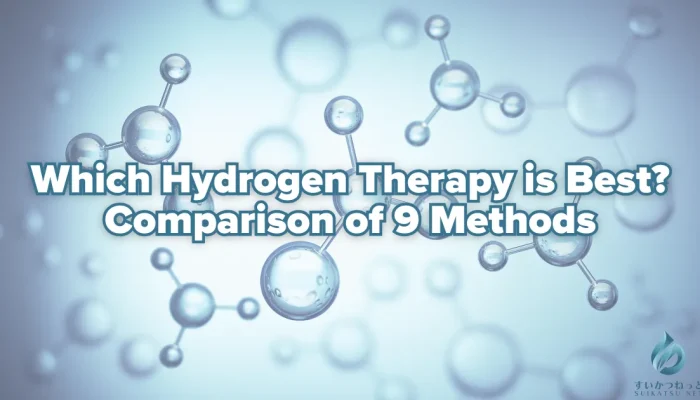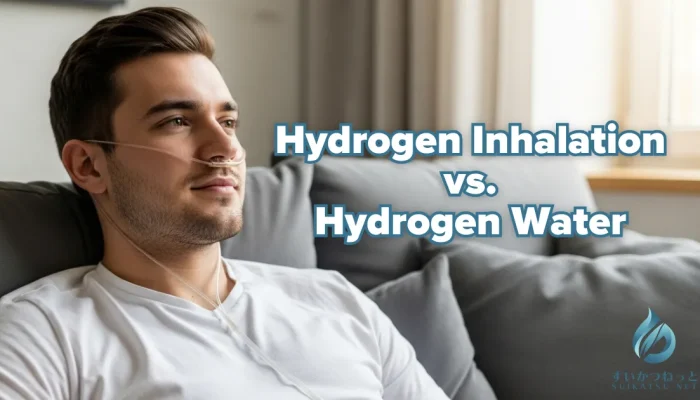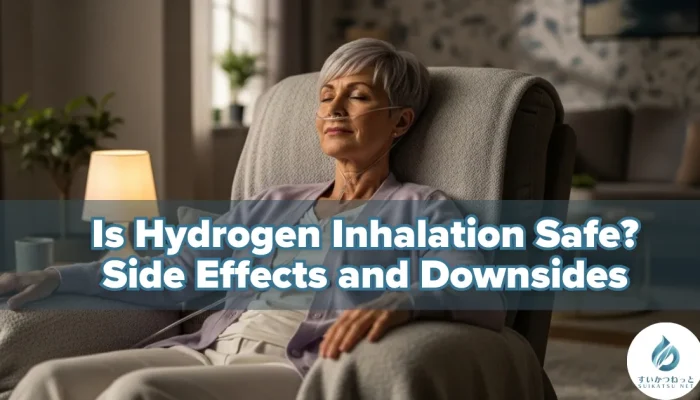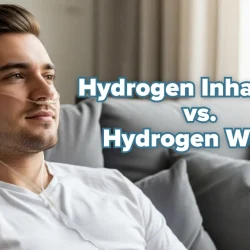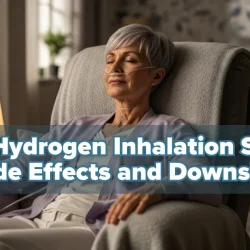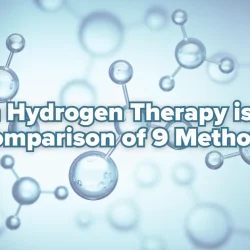Since its role as a therapeutic antioxidant was discovered in 20071), hydrogen has gained significant attention for its potential anti-aging and health benefits.
This has led to a variety of hydrogen therapies, leaving many to wonder: which one is best?
This article explores nine different methods to help you determine the most effective option for your needs. If you’re considering hydrogen therapy, this guide is the perfect place to start.
What is Hydrogen Therapy?
Hydrogen therapy is a therapeutic approach aimed at maintaining health and treating illnesses by introducing molecular hydrogen (H₂) into the body.
Hydrogen is known for its powerful antioxidant properties, which help reduce harmful reactive oxygen species (free radicals).1) This effect is believed to contribute to anti-aging, as well as the prevention and improvement of various diseases.
While the most common method is hydrogen inhalation therapy, where hydrogen gas is inhaled through the nose, several other methods have been developed. We’ll cover those in detail later.
Is Hydrogen Therapy Safe? Are There Side Effects?
Hydrogen is a molecule that exists all around us. To date, research has not reported any significant adverse side effects on the human body, making it a very safe therapy. 2)
And for those wondering about hydrogen’s explosive reputation? You can rest easy. The concentrations used for therapy are controlled and do not pose such risks.
The Science: How It Works and Potential Benefits
Hydrogen is believed to act as a potent antioxidant, selectively neutralizing the most harmful free radicals in the body.1) By reducing this oxidative stress, it’s expected to offer a wide range of health benefits.
In fact, numerous clinical studies have reported various positive effects of hydrogen inhalation therapy.2) In Japan, it was even formerly recognized under a specific advanced medical care system, a testament to its growing body of research.
9 Types of Hydrogen Therapy
Several other methods are offered in clinics and for at-home use. Here are the main types:
- Hydrogen Inhalation
- Hydrogen Water
- Hydrogen Baths
- Hydrogen Goggles
- Hydrogen Supplements
- Hydrogen IV Drips
- Hydrogen Balms
- Hydrogen Creams
- Hydrogen Treatment
Surprised by the variety? Let’s briefly look at each one.
Hydrogen Inhalation

Hydrogen inhalation is the most common and extensively researched form of hydrogen therapy.
It involves breathing in hydrogen gas through a nasal cannula or mask connected to a hydrogen generator.
This method allows for a high and controlled dose of hydrogen to be delivered directly to the lungs, where it is quickly absorbed into the bloodstream and distributed throughout the body.
| Pros | Cons |
|---|---|
| – Delivers the highest and most controlled dose of hydrogen – The most scientifically studied method with a large body of research – Offers systemic, whole-body benefits. | – Requires specialized equipment which can be a significant initial investment – Less portable than other methods – May require visits to a clinic if you don’t own a device |
Hydrogen Water
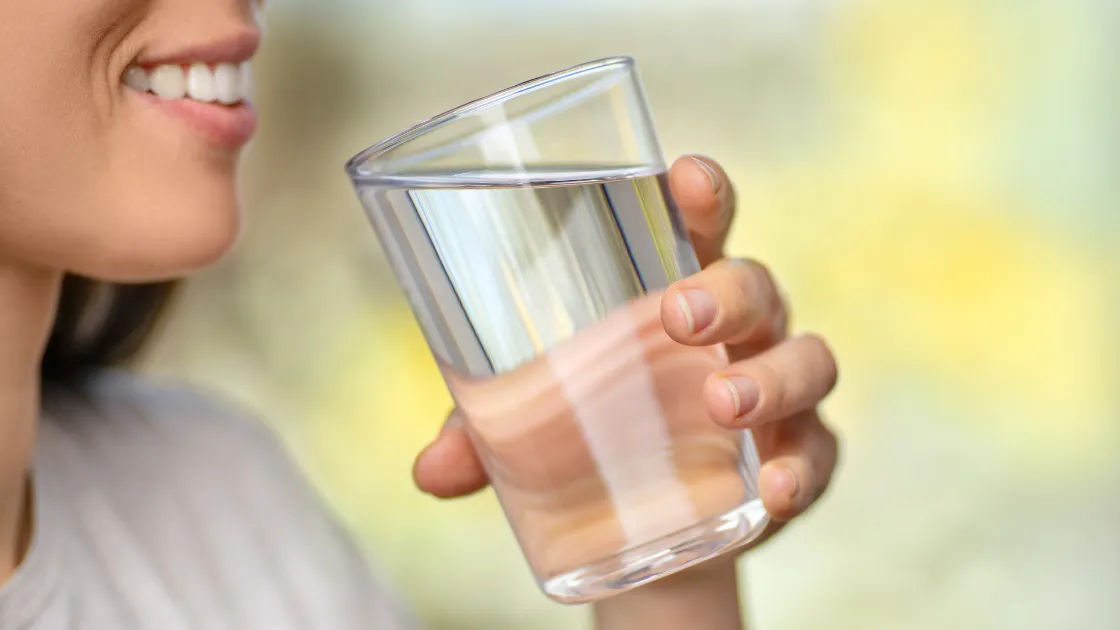
Hydrogen water is simply water infused with molecular hydrogen.
It’s available in ready-to-drink aluminum pouches, as tablets that dissolve in water, or can be made at home with a dedicated generator.
While you might see terms like “activated hydrogen water,” they generally refer to the same thing.
However, there are no official standards for hydrogen concentration, so quality can vary between products.
| Pros | Cons |
|---|---|
| – Easy to drink anytime, anywhere – Generally affordable – May benefit oral and digestive health – Numerous research has done | – Delivers a relatively low dose of hydrogen – Potency can degrade quickly (poor shelf life) – Quality varies between brands |
Since hydrogen inhalation and water are the two most researched therapies, many people wonder which is better. For a detailed comparison, see our in-depth guide.
>> Hydrogen Water vs. Hydrogen Inhalation: Which Is Better?
Hydrogen Bath

A hydrogen bath involves soaking in bathtub water infused with hydrogen.
This can be achieved using bath additives that react with the water to produce hydrogen or by placing a special machine in the tub.
It’s not just a topical treatment; research confirms that molecular hydrogen is effectively absorbed through the skin and enters the bloodstream. For instance, one animal study showed that blood hydrogen levels increased significantly after just 10 minutes in a hydrogen bath, providing clear evidence of this absorption. 3)
The antioxidant properties of the hydrogen are believed to reduce aging and fatigue-related damage, and it’s particularly popular for its potential to enhance skin beauty.
| Pros | Cons |
|---|---|
| – Excellent for targeting widespread skin issues – Relaxing and easy to do – Provides whole-body skin exposure | – Less effective for non-skin related, systemic issues – Requires time for a full bath |
Hydrogen Goggles
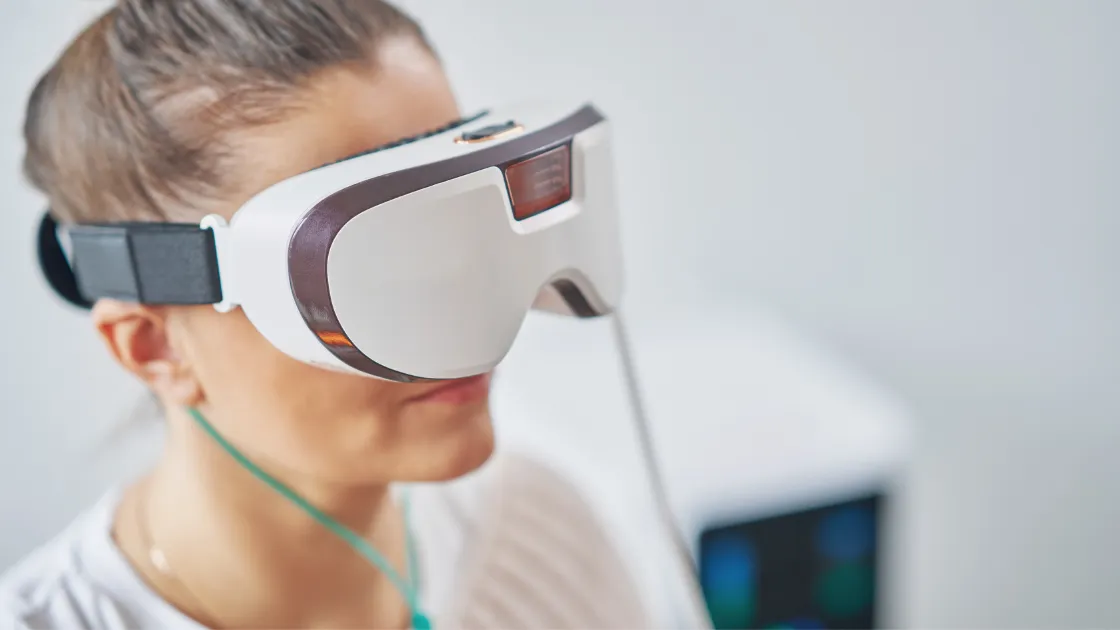
This is a specialized form of hydrogen inhalation.
Instead of inhaling through the nose, a pair of goggles delivers hydrogen gas directly to the eyes.
By absorbing it through the mucous membranes, this method is expected to be more effective for eye-related issues like eye strain and dry eye.
While specific research on hydrogen goggles is still limited, utilizing hydrogen is seen as a promising therapeutic strategy against ocular diseases. 4)
| Pros | Cons |
|---|---|
| – Delivers hydrogen directly to the eyes – Ideal for targeted relief from eye fatigue and dryness | – Benefits are localized to the eyes with limited effect on the rest of the body – Direct research is limited |
Hydrogen Supplements

These are supplements, typically in capsule form, designed to produce hydrogen directly inside your body.
Unlike drinking hydrogen water, these capsules dissolve in the digestive tract, generating hydrogen internally for what is considered a more efficient delivery method.
While there are not many studies yet, a randomized crossover human trial showed the potential for improving dry eye conditions by taking hydrogen supplements. 5)
| Pros | Cons |
|---|---|
| – Highly convenient and portable – No special equipment needed | – Quality can vary widely – Less direct research compared to inhalation or water – Can be expensive in the long run |
Hydrogen IV Drip

This method delivers hydrogen directly into the bloodstream via an intravenous drip, typically mixed with a saline solution.
It’s used with the hope of treating various conditions and preventing cellular aging, and is also gaining attention for cosmetic purposes.
| Pros | Cons |
|---|---|
| – Delivers hydrogen with maximum bioavailability – Can be combined with other nutrients | – Invasive – Must be done in a clinic – Expensive – Published clinical studies are limited |
Hydrogen Balm & Cream
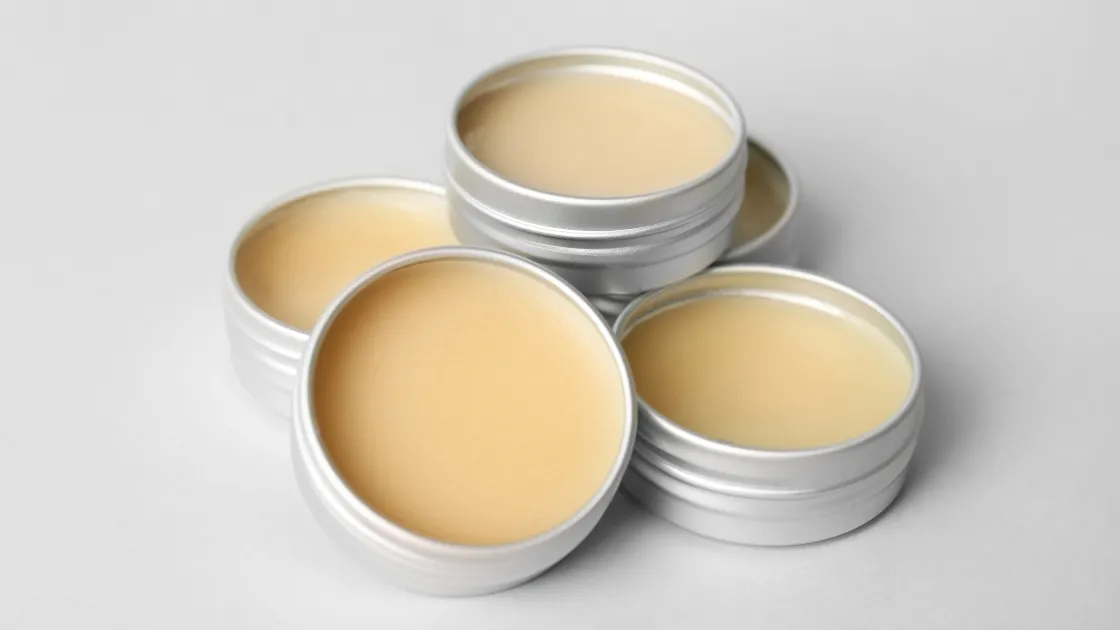
Hydrogen balms and creams are topical products infused with hydrogen.
They are designed to be applied directly to troubled areas of the skin to help improve skin issues.
They can be used alone or in combination with other skincare products like lotions.
| Pros | Cons |
|---|---|
| – Easy to apply to specific areas – Portable and convenient for daily use | – Effects are likely limited to the skin’s surface – Lacks clinical studies to prove efficacy |
Hydrogen Treatment

This category includes professional treatments at spas or salons, as well as products for at-home use.
These treatments, such as hydrogen facials or scalp care, often involve applying hydrogen-infused mists or products.
They are expected to remove harmful free radicals, which can help improve hair dryness and roughness, add moisture and shine, and repair and prevent damage.
| Pros | Cons |
|---|---|
| – Professional application may enhance effectiveness – Often combined with other beneficial spa treatments | – Can be expensive – Requires appointments and visits to a salon – Research on specific treatments is still emerging |
Which Hydrogen Therapy is Most Effective?
Now for the big question: which of these therapies actually works best? Let’s compare them, including hydrogen inhalation, to find out.
At-a-Glance Comparison
To help you choose, here’s a quick comparison of the different methods based on four key factors:
| Methods | Hydrogen Dose | Total Cost | Portability | Research Strength |
|---|---|---|---|---|
| Inhalation | ⭐️ | 🔺 | ❌ | ⭐️ |
| Water | 🔺 | ⭕️ | ⭕️ | ⭕️ |
| Bath | ⭕️ | ⭕️ | 🔺 | 🔺 |
| Goggles | ⭕️ | 🔺 | ❌ | ❌ |
| Supplements | 🔺 | 🔺 | ⭐️ | 🔺 |
| IV drip | ⭕️ | 🔺 | ❌ | 🔺 |
| Balm | 🔺 | ⭕️ | ⭕️ | ❌ |
| Hair Treatment | 🔺 | 🔺 | 🔺 | ❌ |
The Verdict: Which is Best?
The most honest answer is: it depends on your specific goals.
However, we can narrow it down. For methods with limited clinical data, such as hydrogen IV drips, balms, creams, and professional treatments, it might be wise to wait for more research.
Therefore, the best approach is to choose between hydrogen inhalation, hydrogen water, hydrogen baths, and hydrogen goggles based on your needs.
A Guide to Choosing the Right Therapy for You
So, which of the evidence-backed therapies is right for your situation?
For Skin Concerns: Try a Hydrogen Bath
If your main goal is to address skin issues like back acne or blemishes, a hydrogen bath is a great choice. A 2019 Japanese study found that participants who soaked in a hydrogen bath for 10 minutes daily saw improvements in acne and skin spots.
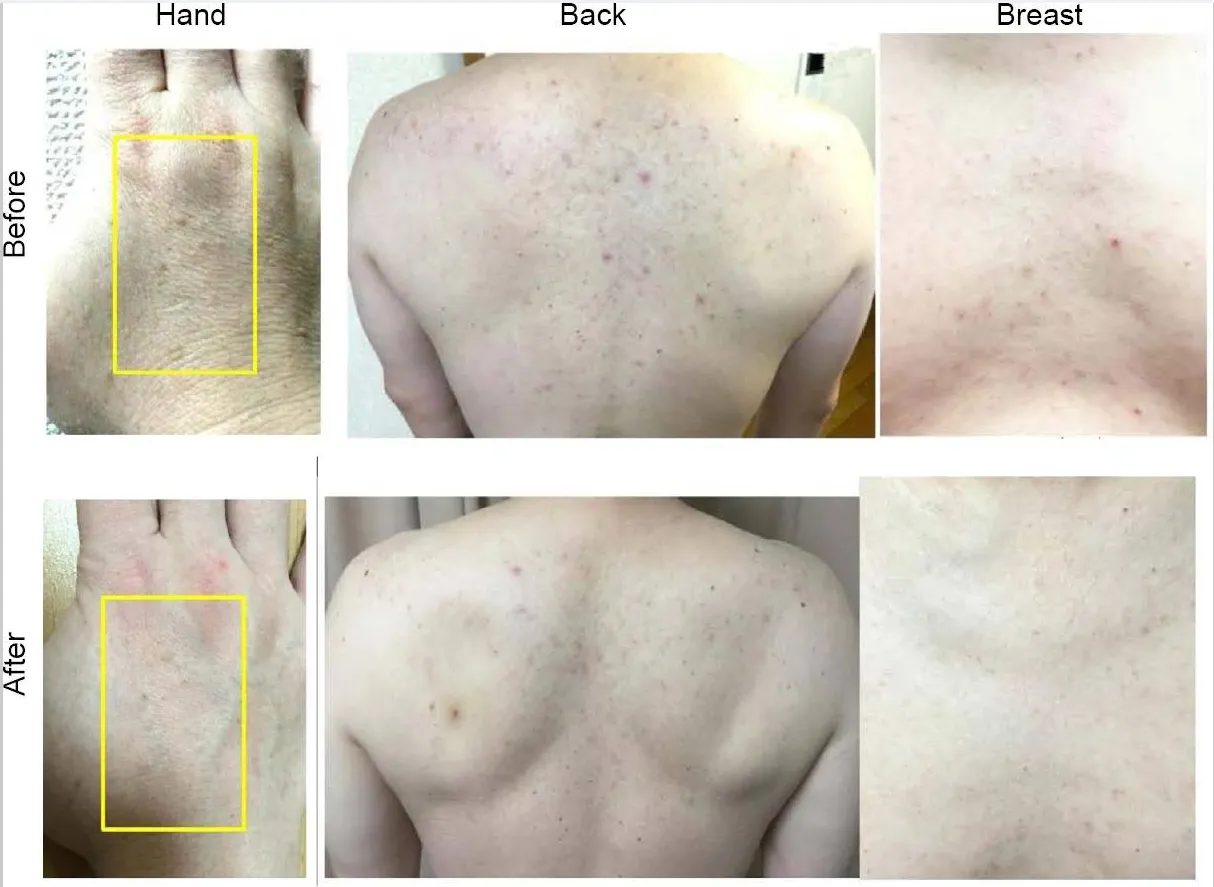
For Eye-Related Issues: Consider Hydrogen Goggles
For conditions like dry eye, eye fatigue, or floaters, hydrogen goggles are the logical choice.
While inhaling hydrogen through the nose may offer some benefits to the eyes, direct application is likely more efficient.
Note that while studies on hydrogen inhalation for eye diseases exist, direct comparison studies between nasal inhalation and goggles have not yet been published.
For Oral Health & Daily Wellness: Go with Hydrogen Water
Hydrogen water is an excellent option for targeting oral health.
Studies have reported that it can help suppress the progression of periodontal (gum) disease. 6)
When you inhale hydrogen, it bypasses the mouth and goes straight to the lungs, so it makes sense that drinking it would be more effective for oral issues.
Hydrogen water is also versatile. People use it to water plants, in fish tanks, and to keep cut flowers fresh longer.
The All-Around Powerhouse: Hydrogen Inhalation
When in doubt, hydrogen inhalation is the most reliable choice.
It’s the method with the most established evidence and is the subject of extensive ongoing research.
Given its history and the volume of positive reports, it stands as the gold standard for systemic, whole-body benefits.
Key Takeaway
While the field is still evolving, the potential health benefits of hydrogen therapy are very promising.
For now, the best way to maximize these benefits is to choose a method based on your specific needs.
By strategically using hydrogen inhalation, hydrogen water, hydrogen baths, and hydrogen goggles, you can tailor your approach to achieve your personal health goals.
We encourage you to try the method that best fits your lifestyle and objectives.



